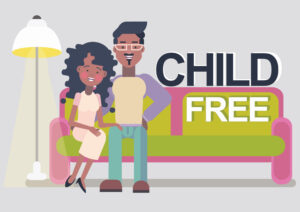African societies and cultures hold childbearing and motherhood in very high esteem. It is the norm for women to get pregnant and bear children within their first year of marriage. In some societies, it is a mandatory rule that women get pregnant before the marriage ceremony commences to ascertain their fertility. This has made the lack of a child, be it voluntarily or involuntarily in most African societies, a grave concern.
Being child-free is the voluntary decision to not have children. In this sense, the woman is fertile but has chosen to not bear children. There is no problem, no ifs, no medical condition, no reproductive challenge, the woman just decides not to have children. Childlessness on the other hand is involuntary. There are circumstances and conditions that prevent the woman from conceiving and bearing children. These could be financial, biological, physiological or psychological.
A good example is Nigerian Actress, Nse Ikpe-Etim, who revealed that her womb had to be removed to save her life after she was diagnosed with Adenomyosis.

How women have navigated childlessness in Nigerian societies
Growing up, I was told stories of how women who after years of marriage had not conceived, would use swelling drugs popularly known as “mawu mawu” in the Yoruba tribe of Nigeria to appear pregnant. Some women would stash calabash or wrap multiple clothes under their outfits all in the bid to avoid ostracism and ridicule in their societies caused by their childlessness. A popular theme in movies at the time was polygamy or failed marriages mostly blamed on women who couldn’t bear children in their marriages.
Research from the University of Ado-Ekiti in Nigeria in 2009, shows that it is considered acceptable for a man to seek children outside the confines of his marriage. Most men do this through either becoming polygamous or by having extramarital affairs if their wives are unable to conceive after a year of marriage. Women in the past have accepted their fate in such circumstances.
Most of the time, people belief that parenthood is a social norm and an inevitable part of human life and so some go to all lengths to achieve it. In most Nigerian societies, women are referred to by the name of their children, thus it is common to hear names like, “Iya Ola” or “Mama Ada”. This has resulted in many Nigerian societies viewing motherhood as a fulfilment of adult development and a prerequisite of respect. For instance, in many Nigerian families, the woman who first bears a child in the family is the most respected irrespective of whether or not she is the oldest. These amongst many others are illogical societal reactions.
Childlessness, a valid choice?
Some childfree women perceive themselves to be ineligible for motherhood based on their personality traits, lack of maternal instincts or practical reasons linked to parenting. Some women choose to be childfree to allow themselves time to fully pursue their academic, career and financial goals. Some women also choose to be childfree to invest more time in personal relationships by forgoing motherhood. For other women, the negative childhood experiences of not having good relationships with parents, coupled with the feelings of depravity from parents they experienced as children can lead them to choose childlessness.
While all of these reasons are relevant, a woman does need to have an appealing reason to not want kids. The mere choice to not have a child is valid and they do not owe anyone or the society an explanation for their decisions. Childbirth and motherhood should never be the prerequisite for respect and acknowledgement of a woman’s womanhood.
Respecting women’s decisions to be childless
As a feminist, I respect a woman’s decision to want children. I honestly think it is a beautiful thing to do. However, society must realise that, there are a number of women who do not aspire to be mothers. People assume many things about childless women but are often not privy to the personal reasons that women have to not want children.
There is a subconscious expectation of women to define themselves as either mothers or aspiring mothers. The African society as a whole finds it hard to wrap their heads around the fact that there are women who genuinely don’t want to be mothers. This is definitely not new, but in recent times, there has been intense sensitization around respecting women’s choice to be childless. People have been called out for asking women why they don’t have kids or when they are going to have kids. Sometimes there is absolutely no problem, it is simply a choice. It is about time the choice to remain childlessness is normalized.

The way forward
In addition to telling the world not to ask women about their plans for becoming mothers, we must create the atmosphere for women to safely, openly and confidently discuss thoughts on reproducing without criticism and subjugation to disrespect. Women who have gone through reproduction should also have safe spaces to talk about their experiences.






Very insightful and educative. Its subjects and topics like this we need to discuss. It is a sensitive subject that cuts across all age groups or generations. Nice one overall.
I love this article. Women do not owe anyone anything. There are so many frustrated parents today who constantly make their children’s lives miserable. They blame the kids but it’s them who in actual fact do not want kids but had them due to societal expectations. I wish many women will break free from societal expectations and do what they want because they want to and not because society has deemed it compulsory when it’s not.
This is really eye opening. There’s a lot of unlearning society needs to do.